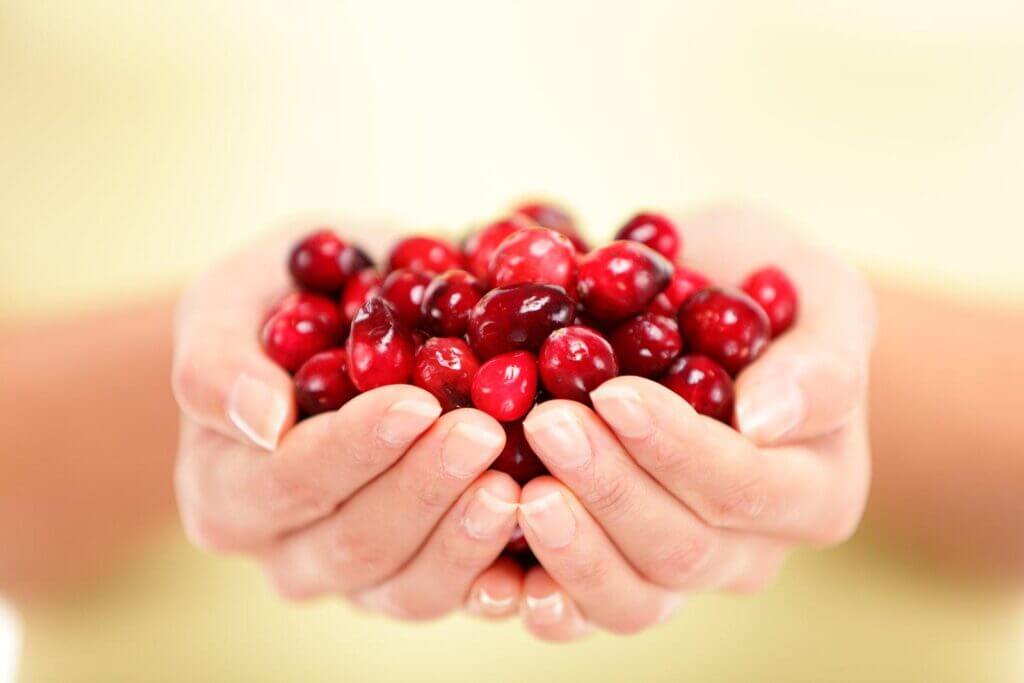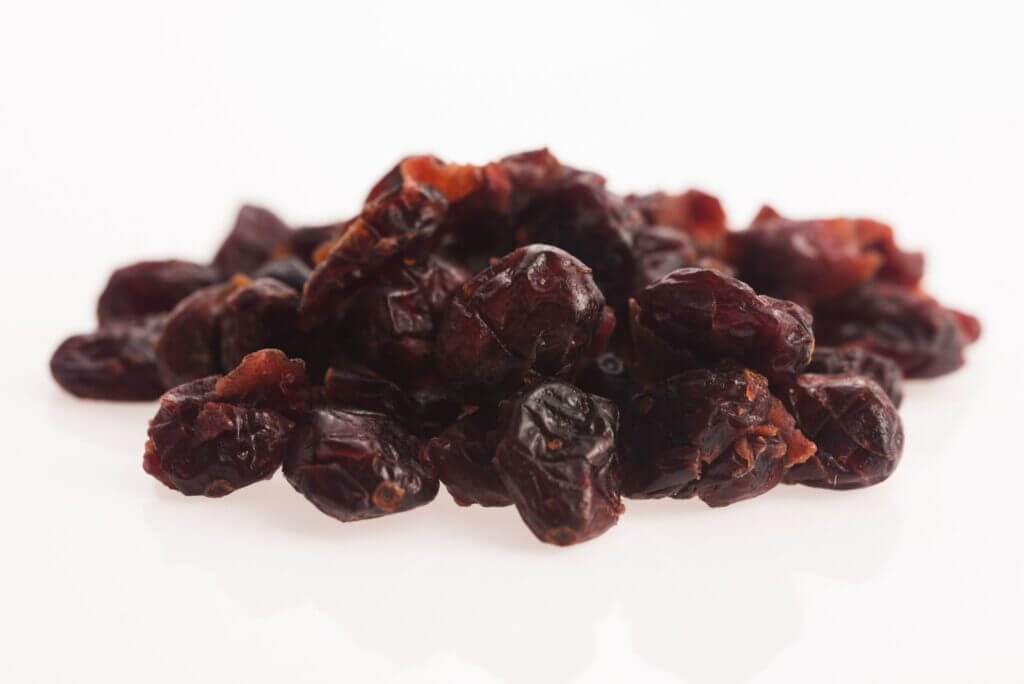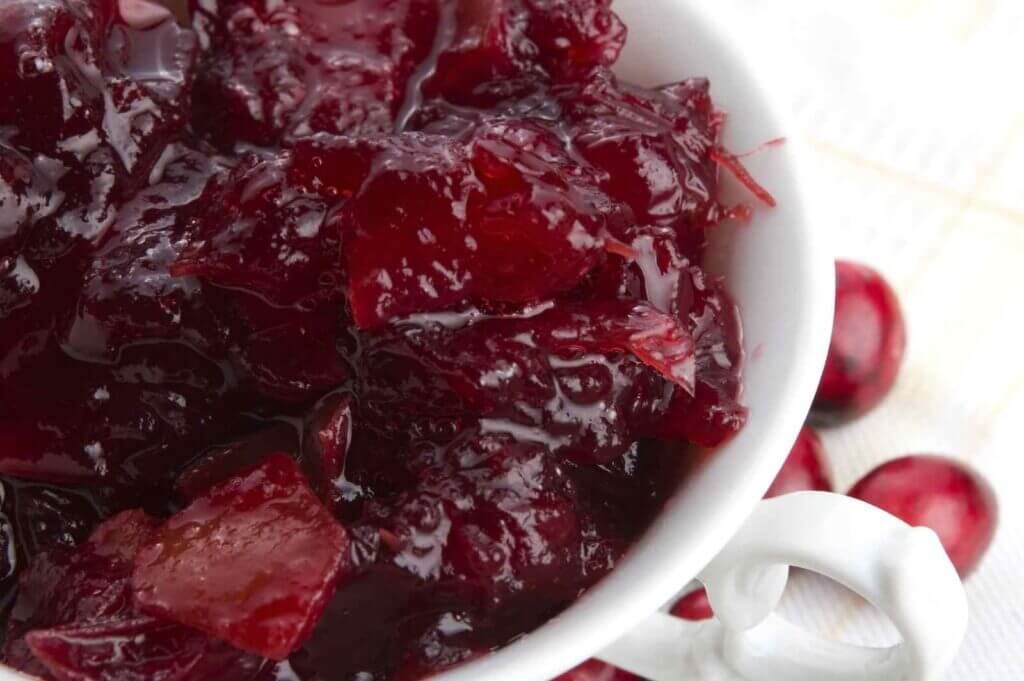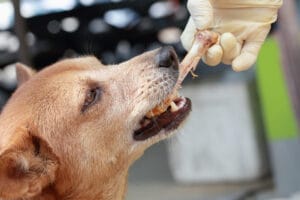Can dogs eat cranberries? You’ll hardly find anyone who doesn’t love a handful of cranberries in their granola or a cranberry sauce with their Thanksgiving turkey. Native people across North America have eaten cranberries for over 12,000 years and this is one of the only four fruits that are truly native to the continent. We all know by now the healthy benefits these berries can bring to human’s diets, but what about dogs? Can dogs eat cranberries? Yes, they can!
You can feed cranberries to your dog but in moderation. They’re not just a tangy-sweet, delicious condiment: Cranberries are jam-packed with nutrients and antioxidants that can help decrease inflammation and support your dog’s immune system.
As a responsible pet parent, you first need to ask yourself some specific questions before feeding your dog most human foods and fruits like cranberries. For example, can dogs eat dried cranberries, and can dogs have cranberry juice?
In this guide, we’ll answer all these questions plus more regarding feeding your pet cranberries. We’ll explore whether cranberries are safe for your dog to eat, whether your dog can eat dried cranberries or cranberry sauce and when cranberries can be bad for your dog.
Some frequently asked questions about dogs eating cranberries will also be answered to ensure you stay informed!
Can Dogs Eat Cranberries?
Yes, dogs can eat cranberries, and they can even be a nutritious treat when given in moderation. These small, tart berries are packed with antioxidants, vitamins, and fiber, which may support immune health and urinary tract function. Unlike some fruits, cranberries are not toxic to dogs, but there are a few things to keep in mind before offering them to your pup.
Fresh cranberries are the best option, as they are low in calories and free from additives. However, some dogs may not enjoy their naturally tart taste. If your pup isn’t a fan of raw cranberries, you can try mixing a few into their food for an added nutrient boost.
While cranberries themselves are safe, cranberry products like dried cranberries, cranberry juice, and cranberry sauce can be problematic. Many of these contain added sugars, preservatives, or artificial sweeteners like xylitol, which is toxic to dogs. Always check the ingredient label before sharing any cranberry-based foods with your pet.
As with any treat, moderation is key. Too many cranberries can cause digestive upset, so it’s best to offer them as an occasional snack rather than a regular part of your dog’s diet. If your dog has never had cranberries before, start with a small amount and monitor for any signs of stomach discomfort.
So, can dogs eat cranberries? Absolutely—as long as they’re plain, fresh, and given in small amounts.
Are Cranberries Safe For Dogs To Eat?
Yes, cranberries are safe for dogs to eat. But as previously mentioned, moderation is vital to ensure your pup enjoys cranberries without any complications.
Not only can dogs have cranberries safely, but they’ll also get a powerful health boost from the unique blend of nutrients that cranberries provide.

Being safe for dogs is not the same as being good for them, is it? This is why so many people are asking about the health benefits of cranberries for their pup.
Cranberries are not just good for dogs; they’re a superfood. Here are some essential vitamins that cranberries contain:
- Vitamin C – supports your dog’s muscles and bones, skin, immune health, and wound healing.
- Vitamin E – a vital antioxidant that strengthens immune health.
- Manganese – essential for metabolism, growth, and the antioxidant system.
- Vitamin K1 – a key component in blood clotting.
Cranberries are also full of fiber, other antioxidants, proanthocyanidins, and quercetin.
These support your dog’s immune health, brain health, gut, and urinary health while helping to prevent joint pain, allergies, cancer, and heart disease.
4 Health Benefits of Cranberries For Dogs
1. Cancer Prevention
According to the statistics, around half of all dogs over ten years of age develop cancer in their senior years, with around one in every four dogs eventually dying from it.
Therefore, it’s crucial to do all you can to prevent this outcome for your beloved pet. Cranberries can help prevent cancer in dogs.
Research shows that cranberries and cranberry-derived products can slow and prevent tumor growth in 17 different cancers – which is an astounding finding!
Cranberries reduce the chances of cancer in your dog through mechanisms like inducing the death of cancer cells, modifying pathways, decreasing cellular proliferation, and altering reactive oxygen species.
2. Managing Immune and Gut Health
Your dog’s immune system relies heavily on what is happening within the gut. A well-balanced gut microbiome is not just good for digestive health but for the immune system as well. And the guy microbiome is directly impacted by what your pet eats.
Cranberries have shown significant efficacy as natural antimicrobials, which can prevent the colonization of your dog’s gut by infection-causing fungi, bacteria, and viruses.
They help maintain balance in your pup’s gut by eliminating the harmful bacteria without harming the good bacteria. They also support a dog’s immune health by lowering inflammation in the gut.

3. Reducing Risks of Heart Disease
Although it’s not common, dogs can also suffer from heart issues like heart murmurs, congestive heart failure, and strokes. Fortunately, cranberries can help reduce the risks of heart disease in your dog!
These fruits contain flavonoids and hydroxycinnamic acids. Consuming these flavonoids and acids can reduce the risk of atherosclerosis which can cause heart attacks and strokes in dogs.
4. Promoting Your Dog’s Oral Health
A healthy mouth is vital for your dog’s overall wellness. Cranberries can help prevent gum disease in your dog by preventing bacteria from sticking to their gums and teeth.
The components in these berries can serve as bioactive molecules that prevent and treat oral diseases.
Can Dogs Eat Dried Cranberries?
Yes! Not only can dogs eat cranberries that are dried, but they can also eat raw, cooked, and freeze-dried cranberries.
Giving cranberries as food in meals and treats works well for general health maintenance and disease prevention.
It’s essential to start with small portions in your dog’s diet to avoid an upset stomach, though.

Can Dogs Eat Cranberry Sauce?
No. One important rule of thumb to remember when feeding your dog cranberry products is to watch out for sugar and other additives.
Cranberry sauce has to be tempered down with sweetness and is likely to have high sugar levels.
Physiologically, your pup doesn’t need the extra sugar, and it’ll do nothing but increase their chances of unhealthy weight gain.
If you are having cranberry sauce with turkey, better give your dog a piece of the turkey instead. As we mentioned in a previous article, turkey is a safe meat for dog, as long as it’s not seasoned with pepper, garlic or salt.
Can Dogs Have Cranberry Juice?
It depends. It’s usually advisable to avoid feeding your dog cranberry juice with high sugar content and other additives or sweeteners – usually, store-bought cranberry juice is packed with these.
The only exception is if you can convince them to drink unsweetened cranberry juice or homemade cranberry juice consisting of nothing but blended cranberries and water!
How To Safely Serve Cranberries To Dogs
1. Stick to Fresh or Plain Cranberries
- Fresh, raw cranberries are the best option—they’re low in calories and free from added sugars or preservatives.
- Frozen cranberries are also safe, as long as they’re unsweetened and not mixed with other fruits.
- Unsweetened dried cranberries can be fed in very small amounts, but always check the ingredients—many brands add sugar or preservatives.
Avoid cranberry sauces, juices, or flavored snacks, as these often contain sugar, artificial sweeteners (like xylitol), or harmful ingredients like grape juice.
2. Start With Small Portions
Dogs process fruit differently than humans, so introduce cranberries gradually to avoid digestive upset. Try offering one or two cranberries to see if your pup enjoys them and tolerates them well. If there are no signs of stomach discomfort, you can slowly increase the amount—but keep it moderate!
3. Mix Into Their Regular Food
If your dog isn’t a fan of raw cranberries on their own, try:
- Sprinkling chopped cranberries over their kibble for a tart flavor boost.
- Blending cranberries into homemade dog treats for a nutritious twist.
- Mixing a few cranberries into plain yogurt (as long as your dog tolerates dairy).
4. Always Cut Cranberries Into Smaller Pieces
Whole cranberries can be a choking hazard, especially for small dogs. To make them safer:
- Chop fresh cranberries into bite-sized pieces before serving.
- Mash them into your dog’s food for easier digestion.
4. Always Cut Cranberries Into Smaller Pieces
Even though cranberries are safe, every dog is different! After introducing them, keep an eye out for:
- Upset stomach (vomiting or diarrhea)
- Changes in urination (cranberries may alter urine acidity)
- Signs of allergies (itching, swelling, or excessive licking)
If you notice any of these symptoms, stop feeding cranberries and consult your vet.
When Are Cranberries Bad For Dogs?
Pet parents often wonder if there are instances when cranberries can be bad for their pet, and the answer is yes.
While cranberries are generally very safe for dogs in moderate amounts, added sugar, preservatives, fillers, unsafe ingredients, and other additives could be toxic for your dog.
This means commercially produced juices, sauces, and sweet treats should be avoided. Cranberries can also interfere with anticoagulant drugs, so consult your vet if your dog takes blood-thinning medications to avoid bleeding risks.

Generally, as long as the cranberries are unsweetened and are not mixed with any additives, preservatives, or potentially harmful ingredients like grapes, then they’re safe for your dog.
At Spot and Tango, the health and safety of your pup are our number one priority. You can choose both wet and dry dog food options with cranberries.
Best of all, these meals are freshly cooked, easy to serve, and personalized to your dog’s unique profile.
One of our best recipes with cranberries is the Spot & Tango Beef & Millet fresh recipe.
This recipe brings you the benefits of a fresh diet in a dry format. All Unkibble meals are made with 100% fresh, human-grade ingredients with no additives, sweeteners, artificial preservatives, or fillers.
A vet-developed innovation at Spot and Tango combines fresh meat, veggies and fruits, and cranberries in a unique fresh dry process that maximizes nutritional integrity.
Frequently Asked Questions
Are Cranberries Safe For Puppies?
Yes, cranberries are safe for puppies to eat. Still, as noted previously, moderation is essential and ensuring there are no additives, preservatives, or sweeteners.
At Spot and Tango, our cranberry meals are formulated by veterinary nutritionists. They meet AAFCO’s nutritional levels for All Life Stages and are therefore safe for puppies.
Do Dogs Like Cranberries?
Some pet parents are astounded that their dogs don’t take to the flavor of cranberries. Cranberries on their own can be quite tart.
The flavor of raw cranberries can be a hard sell to your dog, but having them as part of a cooked meal with other delicious ingredients is a great option as the flavor makes for a great combination when mixed with meat and veggies.
Some dogs that don’t like cranberry taste in some cases enjoy a little sugar-free cranberry juice or have it mixed in with their other food.

Will Cranberries Help My Dog’s UTI?
Yes. Cranberries have antibacterial properties, and they can help prevent E. coli bacteria, which causes most UTIs from sticking to the walls of the urinary tract.
Some vets may tell you that cranberries don’t work and push for antibiotics, but this is not the case. Cranberries have D mannose, which works as an antibiotic in UTI prevention, preventing recurrence and improving symptoms.
If you catch a UTI in the early stages, you can feed cranberries to your dog as an additional way to treat it. However, it’s still heavily recommended that you visit your vet for a professional look at your dog’s condition.
Can Dogs Have Craisins?
No. Craisins are a mixture of raisins and cranberries. Raisins are simply dried grapes, and grapes are toxic to dogs.
You should never give your dog grapes or grape products which means that craisins should not form part of your dog’s diet.
Final Thoughts
One of the best fruits that dogs can eat, cranberries are a great source of nutrients, including vitamins that will help him/her live longer.
There are many ways that you can serve cranberries to your dog: raw, cooked, dry or on an unsweetened natural cranberry juice with water.
Just make sure there are no additional conservatives or sweeteners to the cranberries, because those are the ones that are harmful to dog’s health.
If you want to make sure your dog gets its dose of cranberries without you needing to search for them in the supermarket, find recipes with these fruits in our personalized meal plan. You can add multiple choices so your furry pal has a tasty list of treats available.




















